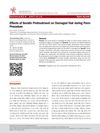 1 citations,
November 2011 in “Archives of Dermatology”
1 citations,
November 2011 in “Archives of Dermatology” A woman's hair loss was caused by her husband's testosterone gel and a diabetic man's nail disease led to bone infection, both treated successfully.
1 citations,
January 2010 in “Springer eBooks” Hair cloning could solve the problem of limited donor hair in transplants.
 1 citations,
April 2009 in “Expert Review of Dermatology”
1 citations,
April 2009 in “Expert Review of Dermatology” The new gel combining calcipotriene and betamethasone is effective and safe for treating scalp psoriasis.
 1 citations,
January 2001
1 citations,
January 2001 Micrografting is the most effective surgical method for permanent hair restoration.
1 citations,
June 1999 in “The American Journal of Cosmetic Surgery” The simplified eyebrow transplant technique is safe, effective, and looks natural.
1 citations,
December 1995 in “Archives of Dermatology” The combination of topical minoxidil and oral finasteride improved hair regrowth in a man with advanced hair loss.
 1 citations,
January 1997 in “Journal of Investigative Dermatology”
1 citations,
January 1997 in “Journal of Investigative Dermatology” RU58841, an androgen receptor blocker, significantly increased hair density, thickness, and length in monkeys when applied topically daily for several months.

Using scalp stem cells can improve hair transplants.
 September 2024 in “International Journal of Research in Dermatology”
September 2024 in “International Journal of Research in Dermatology” Combining PRP with minoxidil and finasteride is the most effective treatment for male hair loss.
 May 2024 in “Research Journal of Pharmacy and Technology”
May 2024 in “Research Journal of Pharmacy and Technology” New, simple, and cost-effective methods can accurately measure Minoxidil in medicines.
 May 2024 in “Proteome science”
May 2024 in “Proteome science” Bleaching damages hair by reducing the quality of keratin and keratin-associated proteins.

Hair transplants now look natural and work well for hair loss.
 November 2023 in “Martor”
November 2023 in “Martor” People still turn to witchcraft for help with modern problems despite technological advances.
 July 2023 in “Research journal of pharmacy and technology”
July 2023 in “Research journal of pharmacy and technology” The hair tonic with Capsicum frutescens extract helps hair grow in male rabbits.
Using enzymes to link proteins makes hair repair treatments more effective and long-lasting.
 March 2023 in “Asian journal of beauty & cosmetology”
March 2023 in “Asian journal of beauty & cosmetology” Keratin pretreatment improves the quality of damaged hair during perming.
April 2022 in “Book Publisher International (a part of SCIENCEDOMAIN International)” Catalase in processed meats may emit electromagnetic fields that increase cancer risk.
 January 2022 in “Cellular and Molecular Biology”
January 2022 in “Cellular and Molecular Biology” Adding Triamcinolone to the anesthetic can reduce swelling after hair transplants, and using Platelet-Rich Plasma can improve hair thickness and patient satisfaction. The SRD5A2 gene also plays a key role in the success of hair transplants.
January 2022 in “Clinical Cases in Dermatology” A 47-year-old man was diagnosed with a specific type of hair loss and advised to use certain medications and avoid hair transplants.

The guide suggests using keratin fibers and wigs to help hair look thicker or hide hair loss.
 September 2019 in “Journal of Investigative Dermatology”
September 2019 in “Journal of Investigative Dermatology” Sandalore, a synthetic scent, was found to reduce hair loss and improve hair growth in women with hair shedding issues.

Ostrich antibodies can help restore hair growth in people with a specific type of hair loss, increasing hair count by 71% on average.
January 2019 in “INTAS POLIVET” The dog fully recovered and regrew hair after treatment.
 October 2016 in “International journal of medical research and review”
October 2016 in “International journal of medical research and review” Minoxidil, a hair loss treatment, may cause acne-like skin eruptions.
Prussian Blue causes hair cuticles to detach, weakening the hair.
 May 2016 in “Research opinions in animal & veterinary sciences”
May 2016 in “Research opinions in animal & veterinary sciences” Maternal aspartame consumption during pregnancy leads to skin damage and higher apoptosis in newborn rat offspring.
 November 2015 in “Hair transplant forum international”
November 2015 in “Hair transplant forum international” Early attempts at using cloned cells for hair transplants failed, but 3D cell growth showed some promise.
 October 2015 in “Reactions Weekly”
October 2015 in “Reactions Weekly” A woman got a scalp condition from using latanoprost, but it improved after stopping the drug and starting other treatments.
August 2015 in “대한피부미용학회지” Zinc sulfate may help hair growth.
The herbal extract CS-10-H significantly promotes hair growth in mice.




















